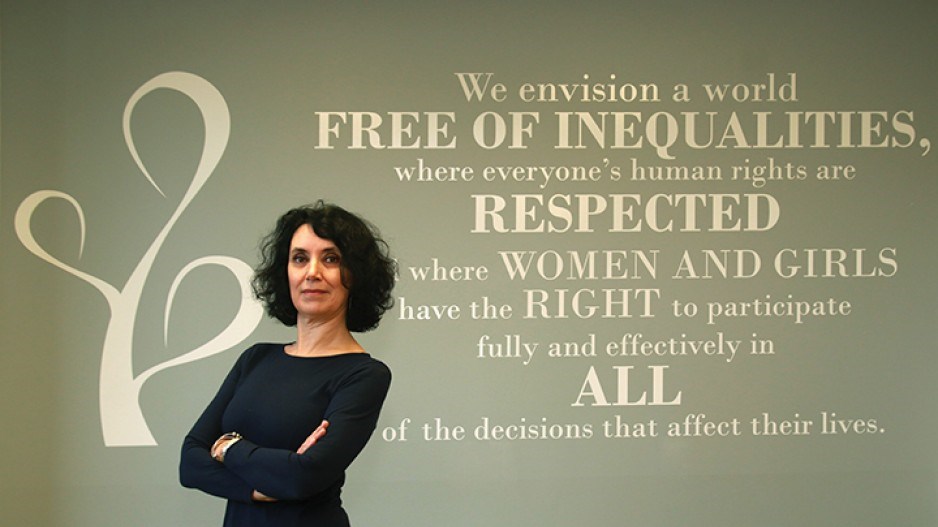Janice Abbott doesn’t romanticize what might be her biggest professional epiphany.
“I was sitting on the bus at 8:30 at night and thought, ‘Property management is a skill we have because we manage the properties we own,’” recalled the CEO of Atira Women’s Resource Society, a women’s anti-violence organization that provides housing to those in need.
“So what about a property management company?”
For much of the mid-to-late 1990s Abbott had been pursuing ideas for a social enterprise to generate dollars to support her non-profit.
Trips to social enterprise conferences in the U.S. and encouragement from a Vancity workshop continued to inspire her.
But there was a problem.
She kept finding herself stuck on the question of what her organization could pursue that was aligned with its expertise but was still “ethical and honourable,” in Abbott’s words.
“It was good that I got stuck a bit because it gave me an opportunity to be talking to everybody about setting up a for-profit business,” she said. “So I was having the conversations with all of the women I work with. I was asking them for business ideas.”
By 2001 another non-profit asked Atira to manage another women’s building.
During travels for those negotiations, Abbott took that epiphanic bus ride and realized her organization may be well positioned to launch a social enterprise focused on property management.
“And so I hired a co-op student from UBC [the University of British Columbia] and we spent a year writing the world’s worst business plan, in hindsight,” she said, chuckling.
“But we took that business plan to Vancity Capital [Corp.] and they loaned us $100,000 to launch the property management company in 2002. And it’s a wholly owned for-profit subsidiary, so Atira Women’s Resource Society is the sole shareholder.”
Atira Property Management Inc. now manages properties for strata corporations, building owners, housing co-operatives, not-for-profit societies and developers.
It also provides jobs to more than 300 workers with significant barriers to employment.
In addition to the revenue generated by the property management company to support the women’s anti-violence organization, the for-profit business can now be leveraged to borrow money to buy property.
But Abbott admits there were countless things she would have done differently from the beginning while she navigated Atira’s non-profit and for-profit elements.
“We lost money for the first couple of years,” she said. “We needed to grow. Property management is a regulated industry. I don’t think I fully appreciated that at the time. There were regulatory requirements we needed to meet. Our managers had to be licensed, we needed a managing broker, all that kind of stuff.
“And so I did a handful of acquisitions in order to grow the company with money borrowed … some of it from Vancity, some from private lenders who supported social enterprise work. And [we] were able to grow the company that way.”
Among the most recognizable projects supported in part by the property management company is the Oneesan House on 502 Alexander Street in Vancouver.
The building gained attention for converting 12 recycled container units into a low-cost, 12-unit building.
Atira’s website estimates the construction costs for the 290-square-foot units totalled $82,500 per unit.
To compare, Atira pegged construction costs for a 320-square-foot unit at Sorella Housing for Women at $220,000 per unit.
Atira’s roster of two for-profit subsidiaries, a housing development arm and 700 staff across 44 sites in the region dwarfs the original resources of the organization when Abbott came aboard in 1992.
There were seven staff members in total back then, so it wasn’t a huge stretch for Abbott to make the leap from communications work at an environmental group to a leadership role at an anti-violence organization.
“By 1996 we had four more programs, a second-stage transition house, a first-stage transition house – and they were a lot of work,” she said.
“In order to do this work, you have to have some faith in humanity and you have to be optimistic and hopeful.… Despite all signs to the contrary, I maintain a lot of faith in humanity.” •
Join us to celebrate the 20th anniversary of the Influential Women in Business Awards March 8 at the Fairmont Waterfront Hotel. For ticketing and full event information, visit https://biv.com/iwib.




